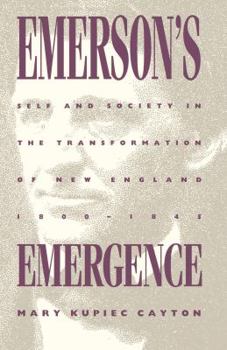Emerson's Emergence: Self and Society in the Transformation of New England, 1800-1845
Select Format
Select Condition 
Book Overview
As the culture of commercial capitalism came to dominate nineteenth-century New England, it changed people's ideas about how the world functioned, the nature of their work, their relationships to one another, and even the way they conceived of themselves as separate individuals. Drawing on the work of the last twenty years in New England social history, Mary Cayton argues that Ralph Waldo Emerson's work and career, when seen in the context of the...
Format:Paperback
Language:English
ISBN:080784392X
ISBN13:9780807843925
Release Date:August 1992
Publisher:University of North Carolina Press
Length:322 Pages
Weight:1.00 lbs.
Dimensions:0.8" x 5.5" x 8.5"
Customer Reviews
0 rating





